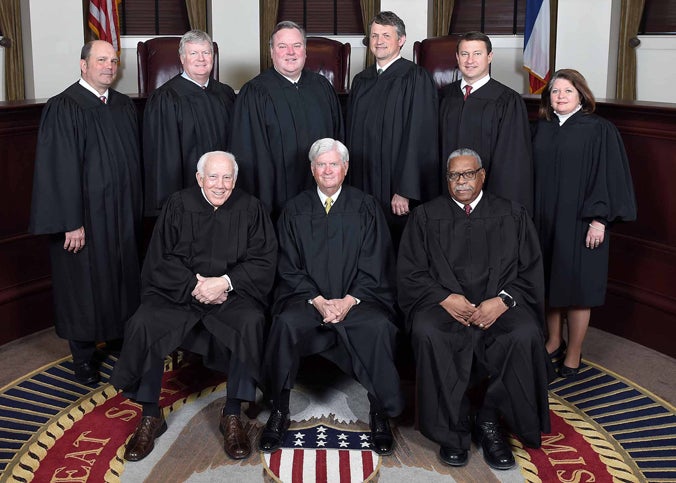Supreme Court ends ‘dead zone’ jail time
Published 4:54 am Saturday, April 22, 2023
By Maria McMullan
The “dead zone”: what criminal justice reformers have called the time frame poor defendants spend in jail while awaiting an indictment without an attorney to advocate for them.
For some, this period has lasted years.
Mississippi has garnered national attention due to its controversial public defender system that has led many to spend time in the infamous “dead zone.”
But on Thursday, the Mississippi Supreme Court unanimously approved an amendment to the state’s rules of criminal procedure to ensure indigent defendants have consistent legal representation to end the “dead zone,” said Cliff Johnson, Director of the Roderick and Solange MacArthur Justice Center, via a phone interview.
The fact that it was a 9-0 decision was significant, Johnson said. “[A]ll traditional partisan and prospective divisions that you sometimes see” came together to address the issue.
Rule 7.2 of the Mississippi Rules of Criminal Procedure had outlined that counsel must be provided to a defendant “following indictment.”
That language allowed some arrested individuals who cannot afford to pay bond or for attorneys to wait until they have been indicted to have an advocate.
In 2018, the Sixth Amendment Center published a scathing report of Mississippi’s public defender system. Defendants charged with felony crimes did not have guaranteed counsel “at the critical pretrial stage between arrest and arraignment following indictment.”
Without money for bail or a lawyer, the “dead zone” awaited them.
The Sixth Amendment Center found that that time frame averaged from two months to over a year.
One man from the Mississippi Delta spent a total of six years in jail before being acquitted of capital-murder allegation. For the two years in between his arrest and indictment, he did not have an attorney.
Long jail stays before the beginning of trials have been common in North Mississippi. According to Dec. 2021 data from the MacArthur Justice Center and University of Mississippi School of Law, poor inmates spent an average of 188.1 days in jail prior to trial in Lafayette County. In Panola County, that number was 198.5—which totals to about six months.
Now, the amended rule seeks to get rid of this “dead zone” by removing language that identifies that an attorney must be provided “following indictment.”
It also requires that a defendant’s counsel is replaced if the initial attorney withdraws from the case.
The amendment will take effect on July 1.
A wide array of voices called upon the Mississippi Supreme Court to address the broken public defenders system. Nonprofit and think tank Empower Mississippi submitted a proposal in May to change the language of Rule 7.2.
Months went by. The following February, the state’s highest court invited public comment on the proposed amendment, setting a March 15 deadline.
Johnson noted that groups from across the country and political spectrum voiced support for ending the “dead zone.” The libertarian think tank the Cato Institute, former United States Attorney General Mike Casey and a group from Georgetown University reportedly provided comments.
At the University of Mississippi School of Law, a petition garnered nearly 300 signatures in support of the amendment.
“At a time when people feel that the world is so deeply divided, we can come together around basic notions of fair play and justice in ways that I think are more encouraging now than ever,” Johnson said.
Although the Mississippi Supreme Court regularly asks for public comment on proposed changes, justices told Johnson that they had never seen an influx of support like this.
“[T]his is part of a larger effort to improve indigent representation in Mississippi,” said Johnson. But this guarantee of “continuous representation will mean that defendants will more aggressively seek relief from pretrial detention.”
In proposing the amended rule, advocates used the city of New Orleans as an example for how continued representation can keep people awaiting trial out of jail. The city upended its indigent defense system after Hurricane Katrina, significantly decreasing the amount of people stuck in jail while awaiting trial.
“[I]f lawyers can get involved early in a case, they can assess the strength of the evidence against their client and either argue for dismissal or reduction of the charges,” said Johnson.
If the evidence significantly weighs against the defendant, then the attorney “can recognize that the likelihood of a guilty verdict is high and attempt to negotiate a favorable plea agreement such that the case gets resolved in a matter of months rather than a matter of years,” he said.
Though advocates are celebrating the amended Rule 7.2, Mississippi remains one of the few states without a full statewide protocol for all indigent defendants.
“We’re one of only six states without a statewide public defender system,” said Johnson. The burden is “pushed down” to individual counties, allowing for a range of standards, practices and outcomes.
Without a statewide system to monitor counties’ compliance with the amended rule, some have wondered whether the change will make a substantial difference.
The Sixth Amendment Center noted that, with no statewide public defender system, the state “has no method to ensure that its local governments are fulfilling the state’s constitutional obligation to provide effective assistance of counsel to the indigent accused in felony cases in its trial courts.”
Johnson says that public defenders can’t sufficiently advocate on behalf of their clients without adequate resources.
“We need to provide the same type of funding for public defenders and their investigators and staff as we do for prosecutors and law enforcement,” he said. “What reasonable person could disagree with the proposition that we should have a fair fight when it comes to someone’s liberty?”
Beyond funding, Johnson and the Sixth Amendment Center have called attention to the lack of an independent body other than county judges who have control over public defenders, which gives judges “too much control over which lawyers are selected to serve” indigent clients, said Johnson.
“There is a feeling among some public defenders that if they are too aggressive and slow the progress of cases through the system that they risk losing their public defender jobs in favor of someone who will go along in the interest of ‘moving the docket.’”
Nonetheless, Johnson believes that zealous attorneys who can assess their clients’ cases from beginning to end will make a significant impact on the state’s structurally insufficient criminal justice system.
“I think that Mississippians whose liberty is at stake need more than any other reform I can imagine is a lawyer who is hell bent on doing everything necessary to provide them with the protections our Constitution guarantees.”






